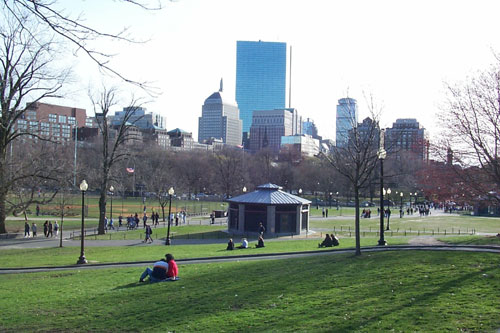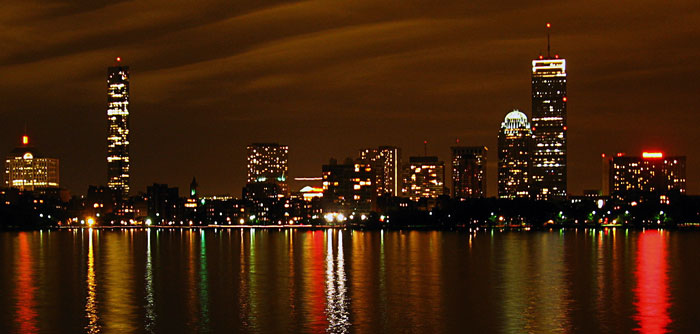|
A home away from
home
Somali
Development Center helps refugees forge a new life in Boston
(Boston, January
23,
2008 Ceegaag Online)
Mariam Kaahin Ahmed came home one day in 1991 and found
her husband dead. He wasn't a soldier, but Ahmed suspects he
was killed in one of the many random acts of violence that
plagued Mogadishu as the once-prosperous capital of Somalia,
and the rest of the country, descended into civil war.
Rival groups shelled each other without regard to
civilians, recalled Ahmed, who now lives in Jamaica Plain.
She fled Mogadishu with her four children, aged 3 to 15 at
the time, and for the next few years they wandered from town
to town, trying to go where the war wasn't. The trek took
them to Ethiopia in 1998 and Egypt in 1999, where each time
they stayed with other Somali refugees they knew. In Cairo,
Ahmed applied to immigrate to the United States, citing her
refugee status, was interviewed, and accepted. Her children
decided to stay, she said; today two are in Kenya and two in
Somalia.
Arriving to Boston March 30, 2000, Ahmed already knew
some Somalis she could stay with until finding more
permanent housing. Within a few weeks, she was taking weekly
citizenship classes at the Somali Development Center in
Jamaica Plain that taught English, US history, government,
and civics, and would eventually prepare her for her
citizenship test.
Ahmed doesn't dwell on the past and dismisses her
troubles to "destiny" while crediting her survival to "faith
in God." When asked about her husband, Ahmed lets out a
short, tired laugh and points to a headline in the Metro
newspaper: "Teen shot three times on crowded Orange Line."
"Everybody die. Everybody die," she said.
The display of resignation and resilience has helped many
refugees of the anarchic country adjust to Boston and a
handful of other North American cities that are far
different from the environments they left behind. It is
often a long process, one that involves challenges common to
immigrants, such as language barriers, but also challenges
unique to Somalis, such as learning to live in a governed
society after knowing only either war or the refugee camps
of Ethiopia and Kenya.
"People think once somebody's already here they can
easily assimilate," said Abdirahman Yusuf, who founded the
Somali Development Center in 1996. He estimates 8,000 to
10,000 Somalis have arrived in New England since 1992. Many
of the more recent refugees are Somali Bantu, from the rural
southern part of the country. "For people who have not been
to school and who have lived in small villages from the
country, everything is new," from refrigerators and medicine
to clothing and "just being part of a society where the
majority of the people are of a different race and
religion."
Ceding power to women
Among the issues some Somali families wrestle with is
whether to allow female members to work, Yusuf said. Despite
financial hardship, men are sometimes reluctant to cede
women the power that comes with employment or help with
child care and other household responsibilities.
"Once a woman acquires skills and money, that becomes
power, the roles have shifted, and many men feel
uncomfortable with that," said Yusuf. "But given the right
support and encouragement, many of them want to work; and
they're very good workers."
Many refugees, including women who have undergone female
genital mutilation, take a long time to open up about their
health issues, said Jennifer Abbott, who taught citizenship
and women's health classes at the Somali center. "I waited a
year before talking about anything sensitive or having to do
with reproductive health," Abbott said.
Abbott, who, moved by the plight of the refugees enrolled
in the New England School of Law last fall, also worried
that many Somalis are placed in violent neighborhoods where
hearing gunshots outside their windows is not unusual.
"These people are trying to flee violence, and they
suffer major post-traumatic stress and they have major
flashbacks," said Abbott, 27. "You want to be grateful for
everything they've been given. But at the same time, it's
just not acceptable to put somebody in a situation like
that."
New challenges
Since Somalia's civil war erupted in 1991, the country
has mostly been without a central government. That makes
teaching American government that much more challenging.
The task falls upon Naima Hashi, 23, who has taught the
SDC's citizenship course since September. Hashi, who
everyone has called Nimo for as long as she can remember, is
also a refugee, and knows the challenges well.
Her family fled the war in 1991 for Addis Ababa, where
Hashi, the seventh of nine children, graduated from high
school. She was 18 when she came to America, but still had
to complete one year of high school to be eligible to apply
to college. She enrolled in Boston English, and recalls her
first year as "difficult."
"I was homesick. It was a different environment," she
said. "I didn't know anybody. I just wanted to get it done."
Hashi finished high school in 2002, went to Newbury
College for a two-year degree, and then transferred to the
University of Massachusetts at Boston, where she majors in
early childhood psychology. She graduates this spring and
hopes to work at the SDC full time.
"I was given the opportunity to do this, and I love to do
this," Hashi said. "I want to help people do something with
their opportunity. Sometimes I think what it would have been
like if I didn't get the opportunity to be a student. If I
can offer my help to those who need help, I would be happy."
Hashi acknowledged that coming from a family that
emphasized education helped her establish herself quickly in
the United States, and credits her father, who took two
years of night classes at Cambridge College to earn a
medical translation degree and today translates at local
hospitals for Somali and Ethiopian patients, for setting an
example.
Cultural adjustment
Not everyone responds so enthusiastically. Many Somalis
hope for peace and a return to Somalia without really trying
here. While most of the 10 to 20 students - almost all
females - who attend the citizenship classes seem to pay
attention to the lessons, a few others seem disinterested,
even resentful.
"Some people are just not up to new challenges, don't
want to try new things, wishing things were just easy and
handed to them," said Yusuf. "But the reality is many will
never go back. There lives are much better now, no matter
what they say."
For refugees struggling with culture shock and language
barriers, the Somali Development Center offers social
workers and teachers who speak their language and know their
culture, but help them acclimate to their new environment.
"We're not trying to Americanize them, but just give them
a view of how things here work," Hashi said.
Ahmed, the refugee widow, said the center helped her pass
her citizenship test and earn her citizenship on Nov. 8,
2006, a day she happily recalls. She reads and understands
English better than she speaks it, knows the different
branches of government, how checks and balances work, and
even ticks off the names of Supreme Court Justices like a
C-SPAN junkie. "If you can't change the past, you have to
work on the future," she said through a translator.
"I believe sometimes people don't know about small,
ethnic-based organizations like ours. They do 90 percent of
the work for these populations but get 10 percent of the
funds," said Yusuf. The center, he complains, could use more
workers but doesn't have the money to hire them. With
children of his own and overwhelmed with demands at he
center, Yusuf sometimes thinks about leaving. But then he
remembers how people like Ahmed got her citizenship and
stays put.
"I want to have an impact," he said. "I want to help
people become Somali Americans."
Source: Boston Globe
Daawo
Boston
      

webmaster@ceegaag.com |

